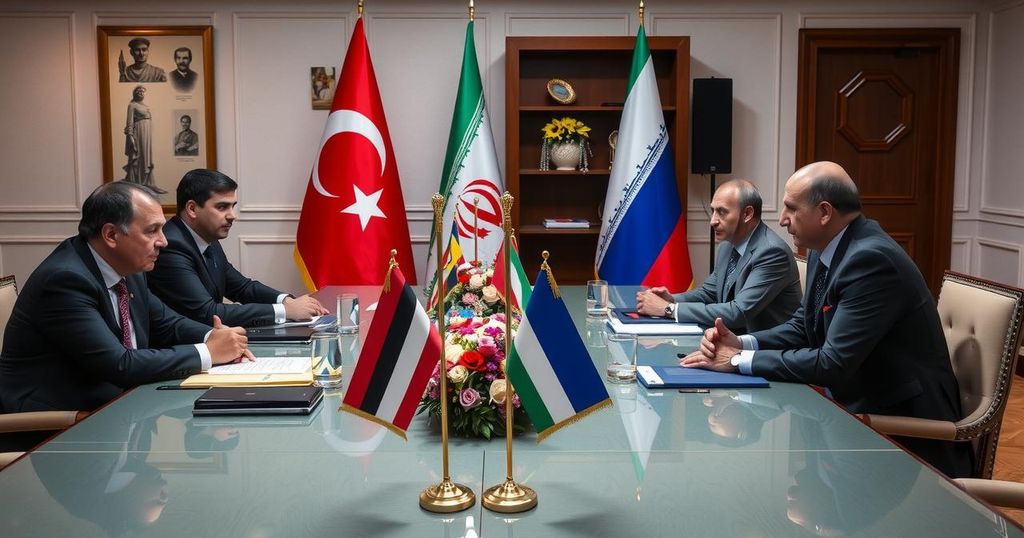Türkiye, Iran, Russia Foreign Ministers Convene in Doha to Address Syrian Crisis

In Doha, the foreign ministers of Türkiye, Iran, and Russia met to address the escalating conflict in Syria, emphasizing the initiation of political dialogue between the Syrian government and opposition forces. This gathering follows significant military advances by anti-regime groups, highlighting the urgent need for a diplomatic resolution to the crisis, which poses regional threats.
On December 7, 2024, in Doha, the foreign ministers of Türkiye, Iran, and Russia convened for discussions regarding the escalating situation in Syria. The meeting was prompted by significant gains made by anti-regime forces in the ongoing conflict. Iranian Foreign Minister Abbas Araghchi announced after discussions with his counterparts, Hakan Fidan of Türkiye and Sergey Lavrov of Russia, that the three nations would initiate “political dialogue between the Syrian government and the legitimate opposition groups.” This dialogue is an extension of ongoing Astana talks aimed at achieving a resolution to the Syrian crisis.
The developments in Syria have been swift, especially following a counteroffensive by the Hayat Tahrir al-Sham (HTS) and allied forces against government positions. A commander within the opposition stated, “our forces have begun the final phase of encircling the capital,” although the Syrian defense ministry contradicted this claim. Prompting further concern, Araghchi referred to the current offensive as a “threat” not only to Syria but also to neighboring nations such as Iraq, Jordan, and Türkiye. This collective apprehension underscores the fragile nature of the current geopolitical climate in the region.
The Syrian conflict, which initially saw support for opposition groups from Qatar since its inception in 2011, is now at a crossroads with a call for negotiation for peace. President Recep Tayyip Erdoğan of Türkiye has urged President Bashar al-Assad to seek reconciliation with his populace. This pivot toward dialogue reflects a broader understanding among involved nations of the escalating military dynamics and the urgent need for non-military resolutions to the conflict. As events unfold, the ramifications of the recent opposition actions are likely to shape the future political landscape in Syria and beyond.
The Syrian conflict has been ongoing since 2011 and involves multiple international players and factions. Originally, the uprising was part of the Arab Spring protests against the Assad regime, which has resulted in a complex civil war. Over the years, various groups, including those supported by regional powers like Qatar, have engaged in fighting against the Iran-backed government forces. The Astana process, initiated in 2017, involves Türkiye, Iran, and Russia in discussions to find a political resolution, with their role being pivotal in shaping the dialogue between conflicting parties.
The meeting of foreign ministers from Türkiye, Iran, and Russia in Doha marked a critical moment amidst a rapidly changing landscape in Syria. As anti-regime forces make strategic advances, the urgency for political dialogue has become apparent. With shared concerns over the regional implications of the conflict, the three nations are poised to seek diplomatic solutions in a bid to stabilize the situation in Syria and mitigate threats to neighboring countries. The evolving dynamics underscore the importance of cooperation among international stakeholders in addressing the challenges posed by the ongoing turmoil.
Original Source: www.hurriyetdailynews.com






